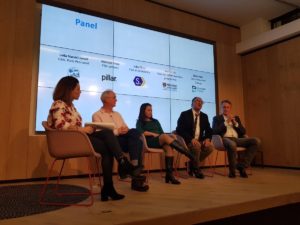 A couple of weeks’ ago, I was invited to speak to around 150 people at a gathering of the Government Blockchain Association (GBA). It was an illuminating experience.
A couple of weeks’ ago, I was invited to speak to around 150 people at a gathering of the Government Blockchain Association (GBA). It was an illuminating experience.
What struck me was that the digital landscape referred to in the Recitals of the General Data Protection Regulation (GDPR) isn’t the same as the technology landscape these ‘digital disruptors’ are building today.
According to the Oxford English Dictionary, blockchain (noun) is: “A system in which a record of transactions made in bitcoin or another cryptocurrency are maintained across several computers that are linked in a peer-to-peer network.”
That sounds very geeky and techie and of little relevance to the rest of us and only those with a strong interest in advanced mathematical algorithms?
Wrong!
Blockchain isn’t just about cryptocurrencies. Clarity in its potential use beyond cryptocurrencies is rapidly emerging and promises to change the face of professional, business and industry sectors such as healthcare, manufacturing, aerospace, energy, financial services and even law.
In short, will blockchain effectively kill the sacred cows of our current understanding of data and consent and dare I say it the GDPR even before it’s fully enforceable across the European Union from 25 May this year?
The ‘digital disruptors’ I met on a cold and rainy night at ‘Silicon Roundabout’ in Old Street, London seem to think so.
They were enthusiastic about the prospect of massive industry disruption and the opportunities for creating new business models as a result of the power of blockchain.
But this isn’t some distant dream. Currently, 80% of banks are developing blockchains, and industries from law to aerospace are already exploring possibilities. So, the next 5 to 10 years will see massive disruption from blockchain adoption as jobs are automated and new industry applications are created.
When the internet was born, people used it to email one another. Businesses like Amazon and Uber were inconceivable.
According to the GBA, blockchain promises to be a revolution of similar proportions, with undetermined potential, ramifications and opportunities.
“Blockchain has the potential not only to change how we transfer value, but could shift our systems of trade, identity, efficiency and governance across all sectors, radically transforming traditional approaches to management,” explains Nir Vulkan, Associate Professor of Business Economics and Co-convenor of the Oxford Blockchain Strategy Programme at Oxford Saïd Business School.
Many are looking at what’s on the horizon rather than how things are done today. And because of the pace of technological change, the future is rapidly catching up with the present.
As a result, is ‘consent’ dead? Does ‘consent’ as we understand that to mean, work anymore in this blockchain landscape? How can a user give consent when they no longer understand what they are consenting to? Even if they read a Privacy Notice or terms of use, do you really think a consumer will understand how you’re processing that personal data?
Is personal data the ‘new oil’ as The Economist proudly proclaimed on its front cover not that long ago? If oil is a finite resource and personal data is infinite resource, do we have to question whether this analogy – although helpful to some extent – is now out-of-date? Should we now be focused on thinking that intelligence – not data – is much more useful as AI and blockchain technologies become smarter at manipulating this stuff?
And so where does this leave GDPR?
According to Nick Oliver of People.io “GDPR is the future of the past. Yes, it’s long overdue. Yes, it’s a good thing. Does it solve for the future? No. Does it solve for the now? Probably not.”
To watch our latest 60 Minutes Fast Track on GDPR, click here
For more information about the GDPR Transition Programme at Henley Business School, click here














I cringe when I read the euphoria around blockchain. Technology has been largely free of regulation but that is fast changing and will accelerate as the law catches up with tech and its societal impact. Let developers test what is possible but the idea that the world will be turned upside down with ‘massive industry disruption’ any time soon is fanciful. We need more reason in this debate that is not found by only speaking to the people that intend to get very rich off the back of blockchain.